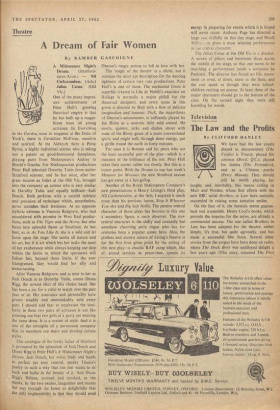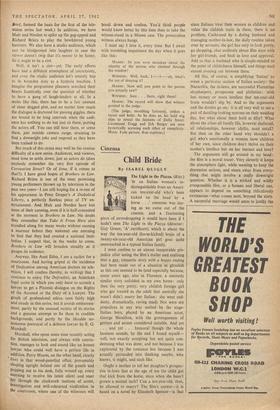Television
The Law and the Profits
By CLIFFORD HANLEY
WE have had the law courts played as documentary (The Verdict is Yours); played for cosiness (Boyd. Q.C.); played for drama (The De/enders); \ and as a Chinese puzzle (Perry Mason). They should still be worth playing for laughs, and, inevitably, this means calling in Muir and Norden, whose first efforts with the new BBC serial Brothers in Law have certainly succeeded in raising some tentative smiles.
On the face of it, the formula seems guaran- teed and irresistible. Henry Cecil's books, which provide the impetus for the series, are already a commercial success. The one called Brothers in Law has been adapted for the theatre, rather limply, it's true, but quite agreeably, and has made a successful film farce. Several other stories from the corpus have been done on radio, where The Dock Brief was unalloyed delight a few years ago. (This story, renamed The First Brief, formed the basis for the first of the tele- vision series last week.) In addition, we have Muir and Norden to spike up the gag-appeal and Richard Briers to play the bewildered young barrister. We also have a studio audience, which can be bludgeoned into laughter in case the viewer doesn't twig that it's meant to be funny. So it ought to be a riot.
Well, it isn't a riot—yet. The early efforts have had a diffident atmosphere of uncertainty, and even the studio audience isn't entirely hep to its bounden duty as a hysteria machine. I imagine the programme planners searched their hearts frantically over the question of whether to have a gang of laugh-leaders at all. In a series like this, there has to be a fair amount of sheer dogged plot, and no matter how much the dialogue is doctored for passing giggles, there are bound to be long intervals when the audi- ence has nothing to do but just sit there, putting the actors off. You can still hear them, or sense them, just outside camera range, straining to find a downright joke and respond as they have been trained to do.
But much of this strain may well be the routine difficulty of a new series. Audiences, and viewers, need time to settle down, just as actors do (does anybody remember the very first episode of Coronation Street? Or of Irma, if it comes to that?). I have good hopes of Brothers in Law. Richard Briers is one of the most promising Young performers thrown up by television in the past two years—I am still hoping for a rerun of his appearance in Peter Draper's A Diabolical Liberty, a perfectly flawless piece of TV en- tertainment. And Muir and Norden have lost none of their cunning, even if it is half-concealed at the moment in Brothers in Law. No doubt they remember that Take It From Here also trundled along for many weeks without causing a murmur before they wakened one morning to find that they had created a national insti- tution. I suspect that, in the weeks to come, Brothers in Law will broaden steadily as it gauges its audience.
Anyway, like Aunt Edna, I am a sucker for a courtroom. And having griped at the incidence of Dedication among American doctors on tele- vision, I will confess (hereby, in writing) that I continue to enjoy The Defenders, an American legal series in which you only have to scratch a lawyer to get a Platonic dialogue on the Rights of the Accused or the Duty of a Lawyer. The graph of professional ethics runs fairly high and steady in this series, but it avoids embarrass- ment, partly by the unusual variety of its stories and a genuine attempt to fix them in credible backgrounds, and partly by the likeable no- nonsense portrayal of a defence lawyer by E. G. Marshall.
Marshall, who spent some time recently acting for British television, and always with convic- tion, manages to look and sound like an honest lawyer who could well have a priSate life in addition. Perry Mason, on the other hand, clearly !Eyes in that wood-panelled office, presumably sleeping upright behind one of the panels and Popping out to his desk, fully wound up, every morning to receive his latest client and steer her through the clockwork motions of arrest, Investigation and well-rehearsed vindication in the courtroom, where one of the witnesses will break down and confess. You'd think people would know better by this time than to take the witness-stand in a Mason case. The prosecution witness always hangs.
I must say I love it, every time. But I await with trembling impatience the day when it goes like this: MASON: So you were mistaken about the identity of the person who climbed through the window!
WITNESS: Well, heck, l—l—ah, what's the use of denying it?
MASON: Now will you point to the person you actually saw?
WITNESS: Sure . . . there, right there!
MASON: The record will show that witness pointed to the judge.
(The judge, mouthing furiously, orders a recess and bolts. As he does so, his bald wig slips to reveal the features of Della Street. Lieutenant Tragg and DA Burger are seen hysterically accusing each other of complicity. Music. Fade picture. Run captions.)















































 Previous page
Previous page